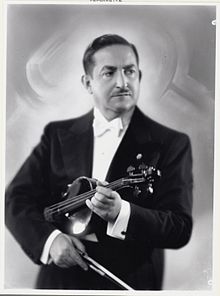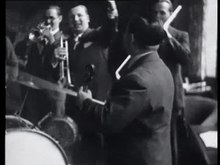Marek Weber
Marek Weber (born October 24, 1888 in Lemberg , † February 9, 1964 in Chicago ) was a German violinist and orchestra conductor .
Live and act
Weber came to Berlin in 1906 to study music at the Stern Conservatory and founded his first orchestra at the age of 20. 1913 first recordings as a string quartet Marek Weber on polyphonic record . In 1914 he took over the management of the orchestra at the Hotel Adlon in Berlin. At the beginning of the 1920s he and his salon orchestra were already engaged for the record: from 1919 to 1925 he worked for the Lindström Group (brand: Parlophon), later he switched to Deutsche Grammophon . But when the Electrola record company was founded in 1926 , which was one of the first in Germany to use the electrical recording process, Weber switched to it and remained loyal to it until 1933. During this time he was one of the most famous German orchestral conductors alongside Paul Godwin , Dajos Béla , Ilja Livschakoff , Efim Schachmeister , Ben Berlin , Edith Lorand and others. An example of the many popular recordings is If Elisabeth didn't have such beautiful legs with Siegfried Arno (vocals).
Marek Weber was not a fan of jazz, which was becoming modern in Europe at the time . Nevertheless, as a salon orchestra director, he had to include dance music with occasional jazz soloism in his program. A legend tells that he liked to leave the podium during his engagements to let his musicians play hot jazz. Meanwhile, he took a sip at the bar . It is interesting that despite Weber's aversion to this music, his orchestra was one of the best German jazz orchestras, as he often hired musicians who represented this style. Among others, musicians such as the black trumpeter Arthur Briggs , his colleagues Rolf Goldstein and Ady "Eddie" Rosner , the pianist Martin Roman and the banjo player Mike Danzi in Weber's orchestra. He also employed well-known refrain singers such as Leo Monosson and Austin Egen . His name is also associated with the famous Berlin hotels, where Weber often provided musical entertainment.
From 1930 onwards, Weber's orchestra was occasionally heard on film. In 1933 he emigrated as a Jew from Germany to the United States , where he made a career as "Waltz King of Radio". After the Second World War, he started a farm and retired into private life. He donated his violins to the Indiana University School of Music . After his death, his widow Anna awarded permanent scholarships for one violinist and one violinist.
Discography
- Rainer E. Lotz : Discography of German Dance Music, Volume 2. B. Lotz, Bonn 1993, ISBN 978-3-9802656-8-3 .
Individual evidence
- ^ Advertisement in the Phonographic Journal 1913
- ↑ Werner Walendowski: Marek Weber (1988 - 1964). Booklet for the CD Marek Weber and his orchestra in the series Die Große Deutsche Tanzorchester. Membrane Music Ltd., Hamburg 2005
| personal data | |
|---|---|
| SURNAME | Weber, Marek |
| BRIEF DESCRIPTION | German orchestra leader and violinist |
| DATE OF BIRTH | October 24, 1888 |
| PLACE OF BIRTH | Lviv |
| DATE OF DEATH | February 9, 1964 |
| Place of death | Chicago |


